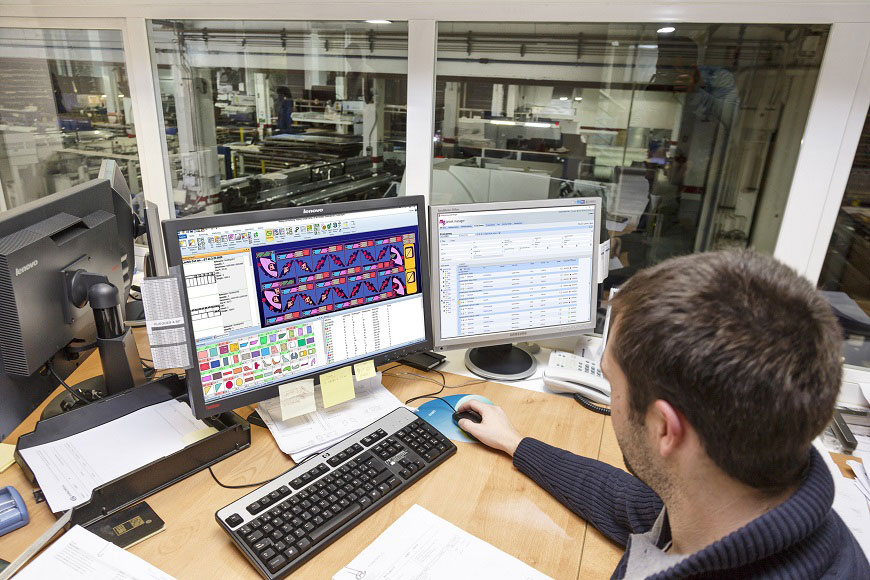Lantek will be showing sheet metal and fabrication companies how moving towards a smart factory concept can have a big impact on business performance in Hall 17 Stand 670 at MACH 2018.

The multinational is a leader in the design, development and supply of software for companies within its sector. It supplies solutions for CAD/CAM/MES and ERP and its expertise helps its customers to optimise their manufacturing processes, reduce costs, increase productivity and profit and make the digital transformation required in the drive towards a smart factory.
“In a country such as the UK, where only 20% of the business fabric is digitized, work has to be started right now. It’s true that change always has elements of uncertainty. However, it has to be done if manufacturers want to stay in the market. Resistance to change and aversion to risk has to be overcome because if companies don’t transform their businesses digitally, they will be unable to compete, won’t grow and will end up exiting the market. Manufacturers would be ill advised to just wait for things to happen, to see what their competitors do. Pioneers in taking the leap to be the first past the finishing line will benefit the most.” , says Rob Powell, Commercial Director, Lantek UK.
Published research shows that digital stragglers will be greatly affected by the digital transformation in just a few years, but those that have made the transition are already seeing the benefits.
Obviously, we have to first of all understand that digital transformation is not an objective, but rather a means to getting further ahead. Once this has been grasped, we have to draw up a roadmap, a digital strategy that enables us to reach our objective.
The conditions for digitalising have never been better for successfully investing and making the transition. As well as the decreasing cost of many of the digital tools, there are a number of reasons companies need to digitalise now.
Digitalisation leads to connectivity. Connectivity leads to enhanced intelligence. With globally-connected factories, company leaders can have levels of transparency covering their entire operation, which has never before been possible. This vision includes better (and real-time) data on costs, resources and delays enabling better productivity and efficiency.
Success relies on efficiency and productivity to drive down operational costs. Companies that are successful now, and will continue to be in the future, understand the role digitalisation plays in optimising efficiency and are transforming their businesses right now.
So how do you know if your company is ready to digitalise? Companies that have made the transition share common characteristics that make them more likely to be successful.
Lantek has helped its customers: optimise productivity and profitability; become more agile to deliver rapid solutions; minimise material waste; provide personalised services and react more quickly to unforeseen circumstances.
Rob Powell adds, “With our solutions we seek to add intelligence to industrial plants enabling them to respond effectively and in real time to the constant changes that occur in sheet metal manufacture. This is an essential part of the digital transformation of enterprises, enabling everything to be interconnected and analyzed. It is already clear that this new way of working is playing a vital part in the success of companies in the sector.”
Nowadays, companies need to be even more innovative than before. Manufacturers need to be always looking for ways to improve efficiency and productivity. They also need to be data driven as data is at the core of everything in the digital world.
Manufacturers may find that competitors are making the move to digitalisation. By waiting, they risk falling behind instead of gaining the advantage. That can cost in potential customers, and in attracting new employees. Plus, intelligence and technology is continuing to develop giving further big advantages and a wider gap between those that digitalise sooner and those that wait.
Technology has reached the integration point to facilitate digitalisation. Automation and robots take production out of human hands resulting in fewer errors. Sensors and software make data easier and cheaper to collect and analyse. This data helps companies keep their machines in better working order. Best of all, the prices of these tools are decreasing making them more accessible.
Big data can now guide companies to make better decisions when making global improvements. Software will be a key selling point for machines when demonstrating how they solve customers’ needs. However, people are a big barrier to getting higher productivity out of the technology. Workers need coding skills to program the machines. Companies need to train current workers and hire for the skills they can’t train quickly.
Finally, agility is also important. As new opportunities arise and competitors make sudden changes, company leaders need to be able to make quick decisions and react to those changes. Using the data will help them make better choices.
There is an opportunity to take the lead in digitalisation right now. By taking it, companies will have the advantage and avoid being overtaken by their competitors.